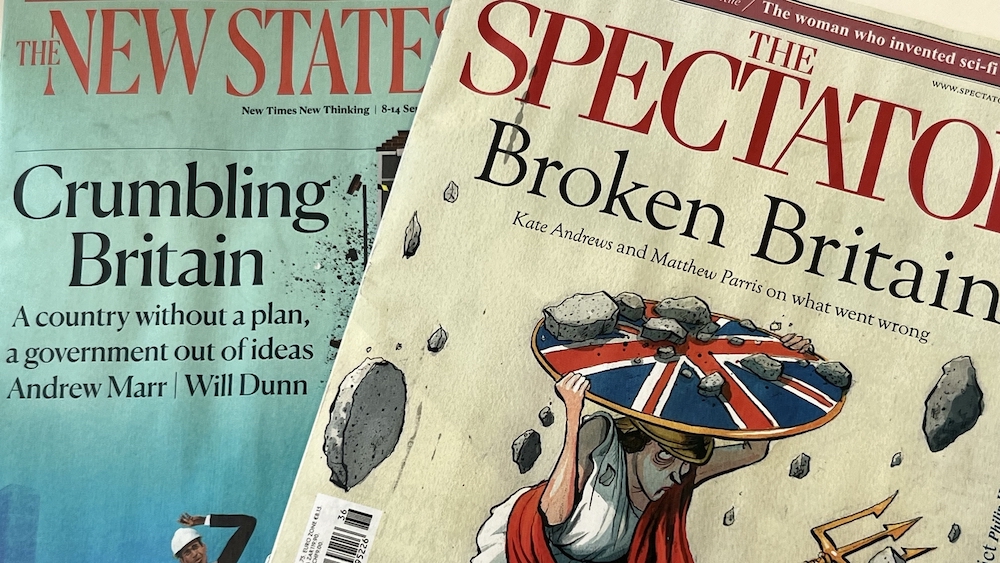British expats of the world, pat yourselves on the back. You’ve left behind a country that is heading somewhere it hasn’t been in global terms since the Black Death was plaguing most of Europe. After confirmation that Britain did indeed enter recession at the end of last year, we’re expected to believe fantastical speculation from 10 Downing Street that the country will “bounce back” in 2024.
Who will produce the magical trampoline to springboard such remarkable bounce-back-ability remains to be seen. Especially given that the closures of Scunthorpe Steelworks and Port Talbot Steelworks have been announced by British Steel and Tata Steel respectively in recent months. This with leave the country that invented industrial steelmaking without a blast furnace-based steel factory for the first time since such a thing existed.
From being the world’s leading steel producer until the early 20th century, a hundred years later Britain sits 26th in the world as of 2023, and is set to drop out of the top 50 over the next two years.
Tata Steel insists that shutting down its Port Talbot blast furnaces is part of a plan to make UK steel more carbon-neutral, sustainable and energy efficient. There are apparently plans to open electric arc furnaces in place of the current carbon-based blast furnaces. However, these plans are contingent on sizable investment from the British government, to the tune of 500 million pounds.
This post-Brexit British government loves nothing more than cancelling a promised investment, though. Especially with no end in sight to economic stagnation. And the next government – set to be led next January by Labour’s knight in shining armour “Sir” Keir Starmer barring the electoral turnaround of the century – is no more committal. In fact, they’ve just cut in half their Green spending pledge for the next five years, and Sir Keir reassured journalists in December that Labour “won’t turn on the spending taps”.
They won’t be turning the furnaces of UK steel back on either, then, if they can help it.
Tories or Labour, the decline continues
Britain’s chief political representatives, regardless of their party, seem content with running an empty shop whose sign is on the blink.
They have no interest in fixing the sign or filling the shop. Or seeing further than their own noses, for that matter. What’s important is whatever’s best for their own precious careers. Whether in ministerial positions or the financial consultancies they’ll take up after they “retire” to the House of Lords, taxpayer handouts in hand.
Today’s British Indian-led Conservative government likes to invoke the British Empire with no hint of irony, as if to convince everyone that being “Great British” in itself is enough to get us by.
But during the zenith of the Empire’s economic and political domination, politicians were very different.
The influence of multi-term prime ministers such as Gladstone and Disraeli extended to having entire schools of political thought named after them. Well, if you’re dissatisfied with the current crop of Tory ministers and their Labour counterparts-in-waiting, and yearn for a return to glory days of old, you’re in luck.
Metaphorical collapse and actual collapse
Step forward, Brexit convert Liz Truss, who would love nothing more than to take us back to the Victorian Age. Good Old Liz (who’s already been prime minister once, for slightly less time than it took a livestreamed lettuce to decompose , but don’t let that stop her) is on a one-woman mission to make Britain great again.
While promoting her new book, which is earnestly titled “Ten Years to Save the West,” Truss had the following pearl of wisdom to offer us: “We essentially need a bigger bazooka, in order to be able to deliver.” Perhaps one day, in post-apocalyptic trade-embargoed and unwokified Britain, these words will be held up as a central tenet of the groundbreaking school of Trussian economics.
Meanwhile, Messrs Sunak and Starmer would do well to have a primary school in their parliamentary constituency named after them by the time they’re finished. That is, if said school isn’t closed down due to its collapsing foam-concrete structure. Like so many of the seemingly endless stream of calamities and controversies overseen by successive UK governments in the past decade, the debacle of RAAC-filled school buildings serves as a perfect metaphor for the post-Brexit equation facing most Brits.
Britain is crumbling, and set to collapse completely at any moment, and we have the science to prove it. So, like innocent schoolchildren who did nothing to deserve being educated underneath potentially fatal aerated concrete ceilings, it’s best to get out while you can.
And stay away until the dust settles and the rubble is cleared.
––––––––––
Read more about Brexit here in Dispatches’ archives.

Alex Beaton
Alex Beaton is a writer from London, UK. His published works include a guide to starting a business in Warsaw, a fictionalised account of his time living in Egypt, and a 2013 report of the political situation in Bulgaria. He has also written extensively about his travels in France, Portugal, Italy and Malta.














